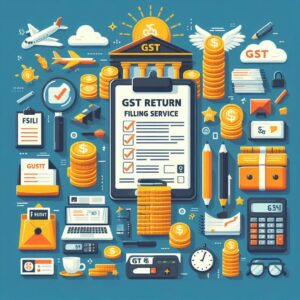
GSTR-3B
GSTR-3B: A Comprehensive Guide
GSTR-3B is a crucial monthly return under the Goods and Services Tax (GST) regime in India. It’s a self-declaration that summarizes outward supplies, inward supplies eligible for Input Tax Credit (ITC), and tax payable. While it’s a simplified summary return, accurate filing is essential for compliance and smooth business operations. This detailed guide covers all aspects of GSTR-3B, including its purpose, components, due dates, importance, and implications of non-compliance.
What is GSTR-3B?
GSTR-3B is a monthly summary return that provides a consolidated overview of a registered business’s sales, purchases, and ITC for a specific tax period. It was introduced as a simplified return to ease the transition to the GST regime and continues to be a vital compliance requirement. It acts as a self-declaration of tax liability, allowing businesses to summarize their transactions and pay their GST dues.
Key Components of GSTR-3B:
GSTR-3B is structured into several sections, each capturing specific information:
-
GSTIN: The Goods and Services Tax Identification Number of the business.
-
Legal Name of the Registered Person: The legal name of the business as registered under GST.
-
Summary of Outward Supplies and Inward Supplies Liable to Reverse Charge: This section details:
- Outward taxable supplies (other than zero-rated, nil-rated and exempted): The total value of taxable sales, excluding zero-rated (exports), nil-rated (tax-exempt), and exempted supplies. This is further broken down into:
- Inter-State supplies to registered persons: Sales made to businesses registered in other states.
- Intra-State supplies to registered persons: Sales made to businesses registered within the same state.
- Inter-State supplies to unregistered persons: Sales made to consumers or unregistered businesses in other states.
- Intra-State supplies to unregistered persons: Sales made to consumers or unregistered businesses within the same state.
- Outward taxable supplies (zero-rated): The total value of exports and supplies to Special Economic Zones (SEZs).
- Other outward supplies (Nil rated, exempted): The total value of sales of goods or services that are not subject to GST.
- Inward supplies liable to reverse charge: The value of purchases on which the recipient is liable to pay GST under the reverse charge mechanism.
- Outward taxable supplies (other than zero-rated, nil-rated and exempted): The total value of taxable sales, excluding zero-rated (exports), nil-rated (tax-exempt), and exempted supplies. This is further broken down into:
-
Details of Inter-State Supplies to Unregistered Persons, Composition Taxable Persons and UIN Holders: This section provides a state-wise breakdown of inter-state supplies made to unregistered persons, composition taxable persons, and Unique Identity Number (UIN) holders (like embassies).
-
Eligible ITC: This section details the Input Tax Credit available to the business:
- ITC Available (whether in full or part): This includes ITC on:
- Import of goods: ITC on goods imported from outside India.
- Inward supplies liable to reverse charge: ITC on purchases subject to reverse charge.
- Inward supplies from ISD (Input Service Distributor): ITC received from an Input Service Distributor.
- All other ITC: ITC on all other eligible purchases.
- ITC to be reversed: This includes ITC that needs to be reversed due to various reasons, such as:
- As per rules 42 & 43 of CGST Rules: Reversal of ITC for inputs used for both taxable and exempt supplies.
- Others: Other reasons for ITC reversal.
- Net ITC Available: The difference between ITC available and ITC to be reversed.
- ITC Available (whether in full or part): This includes ITC on:
-
Values of exempt, nil-rated and non-GST inward supplies: This section captures the value of purchases that are exempt, nil-rated, or not subject to GST.
-
Payment of Tax: This section summarizes the tax payable and the payments made:
- Tax payable: The total GST liability, broken down into Central GST (CGST), State GST (SGST), Integrated GST (IGST), and Cess.
- Tax paid through ITC: The amount of tax paid using available ITC.
- Tax paid in cash: The remaining tax liability paid in cash.
-
TDS/TCS Credit: This section captures details of Tax Deducted at Source (TDS) and Tax Collected at Source (TCS) credits.
Filing Frequency and Due Dates:
GSTR-3B is filed monthly by all registered businesses, regardless of their turnover. The due date for filing GSTR-3B is the 20th of the following month. For example, the GSTR-3B for January must be filed by February 20th.
Importance of GSTR-3B:
- Self-Assessment and Tax Payment: GSTR-3B acts as a self-declaration of tax liability, allowing businesses to summarize their transactions and pay their GST dues.
- Compliance: Filing GSTR-3B is a mandatory compliance requirement under the GST law. Non-compliance can lead to penalties and other legal consequences.
- Reconciliation: GSTR-3B helps businesses reconcile their sales and purchase data with the information available on the GST portal.
- ITC Claim: GSTR-3B is essential for claiming Input Tax Credit on eligible purchases. Accurate reporting of ITC is crucial for reducing the tax burden.
- Data for GSTR-1 and Other Returns: The summary data in GSTR-3B is used to populate other GST returns, such as GSTR-1 (outward supplies).
Consequences of Non-Compliance:
Failure to file GSTR-3B on time can result in several consequences:
- Late Fees: A late fee is levied for each day of delay in filing GSTR-3B.
- Interest: Interest is charged on the outstanding tax amount.
- Blocking of E-Way Bill Generation: Non-filing can lead to blocking of e-way bill generation, hindering the movement of goods.
- Suspension of GSTIN: In severe cases of non-compliance, the GSTIN of the business may be suspended.
Key Points to Remember:
- Accurate Data: Ensure that the data reported in GSTR-3B is accurate and consistent with the business’s books of accounts.
- Timely Filing: File GSTR-3B before the due date to avoid late fees and other penalties.
- Reconciliation: Regularly reconcile the data reported in GSTR-3B with the information available on the GST portal.
- Utilize ITC Effectively: Claim eligible ITC to reduce the tax burden.
Conclusion:
GSTR-3B is an essential return under the GST regime, providing a consolidated summary of a business’s sales, purchases, and ITC. Accurate and timely filing is crucial for compliance, tax payment, and claiming ITC. Businesses must understand the various components of GSTR-3B and ensure they are reporting accurate data to avoid penalties and maintain smooth business operations. By adhering to the guidelines and deadlines, businesses can effectively manage their GST compliance and contribute to a transparent and efficient tax system.






Reviews
There are no reviews yet.